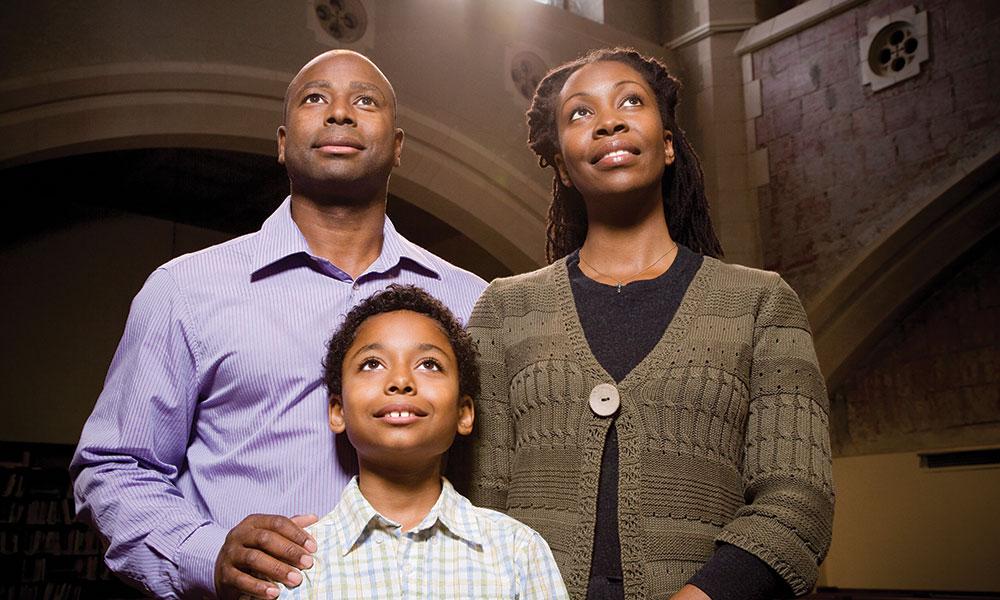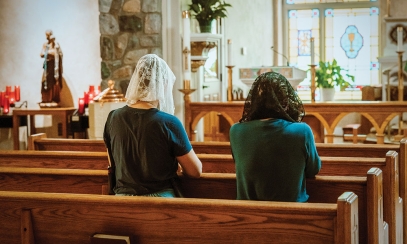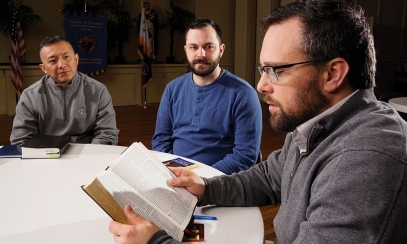
It’s the Most Wonderful Time of the Year
Recently, I asked my children which holiday was more important: Christmas or Easter.
Recently, I asked my children which holiday was more important: Christmas or Easter.
At first, they cheered, “CHRISTMAS!” But then, likely thanks to the great catechesis they receive at our parish school, they hesitated, because, as my oldest articulated, “Easter is all about Jesus dying and rising to save us from our sins. Which is why he came at Christmas in the first place.”
As the conversation continued, I asked them why they first answered Christmas instead of Easter. Their answers predictably revolved around presents, cookies, Christmas movies and music, time off from school, etc. All very logical reasons to conclude that Christmas is more important: We celebrate it more.
For many of us, the Church’s celebration of the Passion, death and resurrection of Christ can seem like no more than a blip on our calendars; one more “long weekend,” like Labor Day or Thanksgiving. But as we seek to live more liturgically, let’s examine how we can give Holy Week the importance it deserves.
Firstly, it’s important to celebrate Holy Week (and all of Lent, for that matter) within the right context.
Sure, Holy Week is a time when we focus on our sinfulness and the manner of suffering and death our Lord accepted to free us from the consequences of that sin. However, this is no sadistic exercise where the goal is the pain and sorrow. God is love, and so everything he does is because of love. This isn’t the story of an angry God taking out his frustration on his son. Nor is it a time for self-flagellation, where we focus on how bad we are (“Look what we did to him!”). Holy Week presents to us, just as Christmas does, God’s love for us. Our response is to examine our lives, discover the parts of our hearts that don’t belong to him, and then root out what has taken the Lord’s rightful place in the kingdom of our hearts.
Of course, this is the pattern of falling more deeply in love. Talk to any couple that’s been married for decades and they’ll have some story about how they had to die to self so that their beloved could live within them and could become the goal and meaning of their lives. It’s no different with our Lord. He wants us to fall in love with him. This is what liturgical living in Holy Week is all about: falling more deeply in love with Jesus.
How to Enter More Deeply Into Holy Week
As a first step, try to attend all the Holy Week liturgies. Most of us have no trouble getting to Palm Sunday Mass or Holy Thursday’s evening Mass of the Lord’s Supper. This year, try to make it to the Good Friday liturgy. If you’re able, I’d recommend taking the day off from work so you can focus on cultivating the silence and reflection the day calls for. If you can’t take the day off, try to at least attend the Stations of the Cross in the evening at a local parish.
Finally, especially if you never have before, attend the Easter Vigil Mass on Holy Saturday night. The Easter Vigil is our greatest feast and our highest liturgy. It’s where we as a Church pull out all the liturgical stops. Light, darkness, water, wine, oil, new birth — they’re all masterfully on display at the Vigil Mass. Plus, it’s the only Mass that starts with a bonfire.
Beyond attending the liturgies, there are various practices and traditions you can adopt for each day to add some significance or enjoyment. On Palm Sunday, you could learn how to weave your palm into a cross. For Holy Thursday, you could try having lamb roast for dinner like Jesus and the apostles did at the Last Supper. “Hot Cross Buns,” a tune you likely learned in fifth grade while playing the recorder, is based on the traditional sweet roll eaten on Good Friday. They are easy to make as a family, or you could get them at many bakeries during the season. Finally, on Holy Saturday, you could make “empty tomb rolls” with kids, or spend a portion of the day cleaning your floors or taking care of the grounds, planting flowers, etc. outside your home. The idea being that the Lord is lying in the earth, in his tomb, and so the ground takes on a certain hallowedness on that day.
Finally, a few ideas for more prayerful activities for the week. In many ways, Palm Sunday is about setting the tone for the rest of the week. You might consider watching a film on the life of Christ, such as Jesus of Nazareth or The Passion of the Christ. Ben Hur is also a good option. Holy Thursday Mass always ends with the traditional eucharistic procession to the “Altar of Repose” located somewhere else in the church or parish campus. The procession and altar are meant to evoke in us the memory of Christ traveling to the Garden of Gethsemane with his disciples to begin his agony. It is common practice in many places to spend the evening traveling to the various parishes in the area to visit their Altar of Repose and make a visit with Jesus. On Good Friday, it’s a good practice to try and spend the hours of noon to 3 p.m. in silence, as these were the hours Jesus spent on the cross. It’s also the perfect day to spend time reading the Gospel accounts of his Passion and death. Last, but not least, bring a bottle or jar with you to the Easter Vigil to bring home some of the new Easter water. You can use the water to bless your family, your home or yourself.
Of course, there is a whole universe of traditions and customs surrounding the celebration of Holy Week and Easter. Each has its own particular history and meaning to help us enter more fully into the mystery of God’s passionate love for us.
Take time as a family to plan out how you will celebrate this holy season and let the miracle of the Resurrection come alive in your homes and your hearts.
Richard Budd is the Director of the Diocesan Office of Marriage and Family Life.



